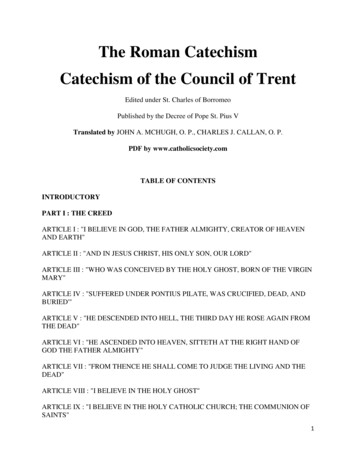
Transcription
The Roman CatechismCatechism of the Council of TrentEdited under St. Charles of BorromeoPublished by the Decree of Pope St. Pius VTranslated by JOHN A. MCHUGH, O. P., CHARLES J. CALLAN, O. P.PDF by www.catholicsociety.comTABLE OF CONTENTSINTRODUCTORYPART I : THE CREEDARTICLE I : "I BELIEVE IN GOD, THE FATHER ALMIGHTY, CREATOR OF HEAVENAND EARTH"ARTICLE II : "AND IN JESUS CHRIST, HIS ONLY SON, OUR LORD"ARTICLE III : "WHO WAS CONCEIVED BY THE HOLY GHOST, BORN OF THE VIRGINMARY"ARTICLE IV : "SUFFERED UNDER PONTIUS PILATE, WAS CRUCIFIED, DEAD, ANDBURIED'"ARTICLE V : "HE DESCENDED INTO HELL, THE THIRD DAY HE ROSE AGAIN FROMTHE DEAD"ARTICLE VI : "HE ASCENDED INTO HEAVEN, SITTETH AT THE RIGHT HAND OFGOD THE FATHER ALMIGHTY"ARTICLE VII : "FROM THENCE HE SHALL COME TO JUDGE THE LIVING AND THEDEAD"ARTICLE VIII : "I BELIEVE IN THE HOLY GHOST"ARTICLE IX : "I BELIEVE IN THE HOLY CATHOLIC CHURCH; THE COMMUNION OFSAINTS"1
ARTICLE X : "THE FORGIVENESS OF SINS"ARTICLE XI : "THE RESURRECTION OF THE BODY"ARTICLE XII : "LIFE EVERLASTING"PART II : THE SACRAMENTSTHE SACRAMENT OF BAPTISMTHE SACRAMENT OF CONFIRMATIONTHE SACRAMENT OF THE EUCHARISTTHE SACRAMENT OF PENANCETHE SACRAMENT OF EXTREME UNCTIONTHE SACRAMENT OF HOLY ORDERSTHE SACRAMENT OF MATRIMONYPART III : THE DECALOGUETHE FIRST COMMANDMENT : "I am the lord thy god, who brought thee out of the land ofEgypt, out of the house of bondage. Thou shalt not have strange gods before me. Thou shalt notmake to thyself a graven thing, nor the likeness of anything that is in heaven above, or in theearth beneath, nor of those things that are in the waters under the earth. Thou shalt not adorethem, nor serve them. I am the lord thy god, mighty, jealous, visiting the iniquity of the fathersupon the children, to the third and fourth generation of them that hate me, and showing mercyunto thousands of them that love me, and keep my commandments."THE SECOND COMMANDMENT : "Thou shalt not take the name of the lord thy god in vain"THIRD COMMANDMENT : "Remember that thou keep holy the sabbath day. Six days shaltthou labour, and do all thy works; but on the seventh day is the sabbath of the lord thy god; thoushalt do no work on it, neither thou nor thy son, nor thy daughter, nor thy man-servant, nor thymaid-servant, nor thy beast, nor the stranger that is within thy gates. For in six days the lordmade heaven and earth, and the sea, and all things that are in them, and rested on the seventhday; wherefore the lord blessed the seventh day and sanctified it."THE FOURTH COMMANDMENT : "Honour thy father and thy mother, that thou mayest belong lived upon the land which the lord thy god will give thee."THE SIXTH COMMANDMENT : "Thou shalt not commit adultery"2
THE SEVENTH COMMANDMENT : "Thou shalt not steal"THE EIGHTH COMMANDMENT : "Thou shalt not bear false witness against thy neighbour"HE NINTH AND TENTH COMMANDMENTS : "Thou shalt not covet thy neighbour's house:neither shalt thou desire his wife, nor his servant, nor his hand-maid, nor his ox, nor his ass, noranything that is his."PART IV : THE LORD'S PRAYEROPENING WORDS OF THE LORD'S PRAYERTHE FIRST PETITION OF THE LORD'S PRAYER : "HALLOWED BE THY NAME"THE SECOND PETITION OF THE LORD'S PRAYER : "THY KINGDOM COME"THE THIRD PETITION OF THE LORD'S PRAYER : "THY WILL BE DONE"THE FOURTH PETITION OF THE LORD'S PRAYER : "GIVE US THIS DAY OUR DAILYBREAD"THE FIFTH PETITION OF THE LORD'S PRAYER : "AND FORGIVE US OUR DEBTS, ASWE FORGIVE OUR DEBTORS"THE SIXTH PETITION OF THE LORD'S PRAYER : "AND LEAD US NOT INTOTEMPTATION."THE SEVENTH PETITION OF THE LORD'S PRAYER : "BUT DELIVER US FROM ----------------------ORIGIN OF THE ROMAN CATECHISMThe Church at the Council of Trent, assembled December 13, 1545, seeing the need of a uniformand comprehensive manual which would supply parish priests with an official book ofinstruction for the faithful, ordered the preparation of the work which has ever since beenvariously known as the Catechism of the Council of Trent, the Catechism for Parish Priests, theRoman Catechism, or the Catechism of Pius V. It was some months, however, after the openingof the Council before mention was made of any kind of catechism. This was during the fourthsession, on April 5, 1546. Eight days later the draft of a decree was read proposing that there bepublished in Latin and in the vernacular a catechism to be compiled by capable persons forchildren and uninstructed adults, "who are in need of milk rather than solid food." The purposeof such a manual was to afford instruction for beginners in the primary duties of a Christian lifeand to prepare them for further and higher religious education. The idea met with generalapproval, but as the Council was occupied with matters more pressing, we hear nothing further3
about it until sixteen years later, in 1562. According to some the question of the Catechism wasbrought up by St. Charles Borromeo during the eighteenth session and a commission actuallyappointed on February 26, 1562. What is certain is that the Papal Legates, after a protracteddiscussion, had named a committee before the end of that year; for on January 3, 1563, theyinformed the procurators of Charles IX and of Ferdinand I of the existence of such a committeeand assured them that work on the Catechism was already under way. The principal members ofthis committee, besides its president, Cardinal Seripandi, O. S. A., were Leonardo Marini, O. P.,Archbishop of Lanciano, Egidio Foscarari, O. P., Bishop of Modena, Muzio Calini, Bishop ofZara, and Francesco Foreiro, O.P. There were many other collaborators, chief among whom wereMichael Medina, a Franciscan, and Christopher Sanctotisio, O. S. A., who assisted with thefourth and ninth Articles of the Creed respectively; four French theologians to whom wereassigned the first four Commandments; the Dominicans, John de Luderna, Benedict Herba,Eliseus Capys, and the Franciscan, Alphonsus Contreras, to whom were given respectively thefifth, sixth, seventh, and eighth Commandments; a theologian of Granada was entrusted with thelast two Commandments of the Decalogue. The following appear to have collaborated on theSacraments: three Flemish theologians, on Baptism, Confirmation, and the Eucharist; NicholasOrmanetus, on the Sacrament of Penance; Peter Fernandez, O. P., on Matrimony; CosmasDamiani, Abbot of the Augustinian Canons Regular, on Orders; Arias Montanus, on ExtremeUnction. All those who had part in the work of the Catechism were instructed to avoid in itscomposition the particular opinions of individuals and schools, and to express the doctrine of theuniversal Church, keeping especially in mind the decrees of the Council of Trent.During the twenty-fourth session, the work on the Catechism was brought to the attention of theCouncil itself, at a meeting on September II, 1563. After various discussions a new plan wasadopted. Instead of a manual for children and uninstructed adults, it was decided to prepare amuch more extensive and more thorough work to be used by parish priests in their instruction ofthe faithful. A final decree regarding such a catechism was passed in a general meeting ofNovember 2nd, of the same year, wherein it was enjoined on all Bishops to see that theCatechism should be faithfully translated into the vulgar tongue and expounded to the people byall parish priests.As the Council was about to close, the Catechism committee, as it appears, were ordered tosubmit to the assembled Fathers the work they had so far accomplished. This was done at thegeneral meetings between the 22nd and the 25th of November, and as the work was not finishedthe Holy Father was requested to take charge of it and to see that the Catechism was brought tocompletion and published. The manuscript was, therefore, carried to Rome, and the work wascontinued with little delay. Meanwhile Cardinal Seripandi died, and St. Charles Borromeo wasappointed to succeed him as president of the Catechism committee. On December 21, 1564,Bishop Foscarari also died. To complete the work the new president enlisted the services ofseveral more theologians, such as Gabriel Paleotti and the Portugese Statius.In order that the literary style of the Catechism might be in keeping with the sublimity of itsdoctrine, St. Charles called to its service the greatest masters of the Latin tongue of that age.These were Paulus Manutius, Giulio Pogiani, Cornelius Amaltheus, Silvius Antonianus, andPietro Galesini. When the work was finished a first revision of the style was undertaken. Thepolishing of the first two parts was done by Calini, who had already been engaged in the4
composition of the Catechism. The third part was attended to by Galesini, and the fourth byPogiani. This revision seems to have been completed by the end of the year 1564. Early in thefollowing year, by order of St. Charles, who desired to secure absolute uniformity in the style, asecond literary revision of the entire work was made by Pogiani.Meanwhile Pius IV died and was succeeded on January 17, 1566, by Pius V. One of the first actsof the new Pontiff was to appoint a number of expert theological revisers to examine everystatement in the Catechism from the viewpoint of doctrine. Chief among these revisers wereCardinal Sirlet and the two Dominicans, Thomas Manriquez and Eustachius Locatelli. By July ofthat year the work on the Catechism was finished. But it was not until the close of the year that itappeared under the title, Catechismus ex decreto Concilii Tridentini ad Parochos Pii V Pont.Max. jussu editus.AUTHORITY AND EXCELLENCE OF THE ROMAN CATECHISMThe Roman Catechism is unlike any other summary of Christian doctrine, not only because it isintended for the use of priests in their preaching, but also because it enjoys a unique authorityamong manuals. In the first place, as already explained, it was issued by the express command ofthe Ecumenical Council of Trent, which also ordered that it be translated into the vernacular ofdifferent nations to be used as a standard source for preaching. Moreover it subsequentlyreceived the unqualified approval of many Sovereign Pontiffs. Not to speak of Pius IV who didso much to bring the work to completion, and of St. Pius V under whom it was finished,published and repeatedly commended, Gregory XIII, as Possevino testifies, so highly esteemed itthat he desired even books of Canon Law to be written in accordance with its contents. In hisBull of June 14, 1761, Clement XIII said that the Catechism contains a clear explanation of allthat is necessary for salvation and useful for the faithful, that it was composed with great careand industry and has been highly praised by all, that by it in former times the faith wasstrengthened, and that no other catechism can be compared with it. He concluded then, that theRoman Pontiffs offered this work to pastors as a norm of Catholic teaching and discipline so thatthere might be uniformity and harmony in the instructions of all. Nor have the Sovereign Pontiffsin our own days been less laudatory of the Catechism. Pope Leo XIII, in an Encyclical Letter ofSeptember 8, 1899, to the Bishops and clergy of France, recommended two books which allseminarians should possess and constantly read and study, namely, the Summa Theologica of St.Thomas and "that golden book," the Catechismus ad Parochos. Regarding the latter work hewrote: "This work is remarkable at once for the richness and exactness of its doctrine, and for theelegance of its style; it is a precious summary of all theology, both dogmatic and moral. He whounderstands it well, will have always at his service those aids by which a priest is enabled topreach with fruit, to acquit himself worthily of the important ministry of the confessional and ofthe direction of souls, and will be in a position to refute the objections of unbelievers."Likewise Pius X in his Encyclical Acerbo nimis of April 15, 1905, declared that adults, no lessthan children, need religious instruction, especially in these days. And hence he prescribed thatpastors and all who have care of souls should give catechetical instruction to the faithful insimple language, and in a way suited to the capacity of their hearers, and that for this purposethey should use the Catechism of the Council of Trent Still more recently, on February 14, 1921,speaking in the name of Benedict XV, Cardinal Gasparri, Papal Secretary of State, thus wrote to5
the Archbishop of New York relative to the latter's Program for A Parochial Course of DoctrinalInstructions, based on the Catechism: "It is superfluous to add that the value of the work isenhanced by the fact that it has been planned and executed in perfect harmony with theadmirable Catechism of the Council of Trent."Besides the Supreme Pontiffs who have extolled and recommended the Catechism, so manyCouncils have enjoined its use that it would be impossible here to enumerate them all. Within afew years after its first appearance great numbers of provincial and diocesan synods had alreadymade its use obligatory. Of these the Preface to the Paris edition of 1893 mentions eighteen heldbefore the year 1595. In five different Councils convened at Milan St. Charles Borromeo orderedthat the Catechism should be studied in seminaries, discussed in the conferences of the clergy,and explained by pastors to their people on occasion of the administration of the Sacraments. Inshort, synods repeatedly prescribed that the clergy should make such frequent use of theCatechism as not only to be thoroughly familiar with its contents, but almost have it by heart.In addition to Popes, and Councils, many Cardinals, Bishops and other ecclesiastics,distinguished for their learning and sanctity, vied with one another in eulogizing the Catechismof Trent. Among other things they have said that not since the days of the Apostles has therebeen produced in a single volume so complete and practical a summary of Christian doctrine asthis Catechism, and that, after the Sacred Scriptures, there is no work that can be read withgreater safety and profit.In particular, Cardinal Valerius, the friend of St. Charles Borromeo, wrote of the Catechism:"This work contains all that is needful for the instruction of the faithful; and it is written withsuch order, clearness and majesty that through it we seem to hear holy Mother the Churchherself, taught by the Holy Ghost, speaking to us. It was composed by order of the Fathers ofTrent under the inspiration of the Holy Ghost, and was published by the authority of the Vicar ofChrist."Salmanticenses, the great Carmelite commentators on St. Thomas, paid the following hightribute to the Catechism: "The authority of this Catechism has always been of the greatest in theChurch, because it was composed by the command of the Council of Trent, because its authorswere men of highest learning, and because it was approved only after the severest scrutiny byPopes Pius V and Gregory XIII, and has been recommended in nearly all the Councils that havebeen held since the Council of Trent."Antonio Possevino, an illustrious Jesuit, and the preceptor of St. Francis de Sales, said: "TheCatechism of the Council of Trent was inspired by the Holy Ghost."In his immortal Apologia Cardinal Newman writes: "The Catechism of the Council of Trent wasdrawn up for the express purpose of providing preachers with subjects for their sermons; and, asmy whole work has been a defense of myself, I may here say that I rarely preach a sermon but Igo to this beautiful and complete Catechism to get both my matter and my doctrine.""Its merits," says Dr. Donovan, "have been recognized by the universal Church. The first rankwhich has been awarded the Imitation among spiritual books, has been unanimously given to the6
Roman Catechism as a compendium of Catholic theology. It was the result of the aggregatelabors of the most distinguished of the Fathers of Trent, . . . and is therefore stamped with theimpress of superior worth."Doctor John Hogan, the present Rector of the Irish College in Rome, writes thus: "The RomanCatechism is a work of exceptional authority. At the very least it has the same authority as adogmatic Encyclical, -- it is an authoritative exposition of Catholic doctrine given forth, andguaranteed to be orthodox by the Catholic Church and her supreme head on earth. Thecompilation of it was the work of various individuals; but the result of their combined labors wasaccepted by the Church as a precious abridgment of dogmatic and moral theology. Officialdocuments have occasionally been issued by Popes to explain certain points of Catholic teachingto individuals, or to local Christian communities; whereas the Roman Catechism comprisespractically the whole body of Christian doctrine, and is addressed to the whole Church. Itsteaching is not infallible; but it holds a place between approved catechisms and what is de tide."We are enabled to realize from the foregoing testimonies how invaluable is the treasure wepossess in the Tridentine Catechism. It is a Vade Mecum for every priest and ecclesiasticalstudent. In it the latter will find a recapitulation of all the more important and necessary doctrineshe has learned throughout his theological course; while to the priest it is not only a review of hisformer studies, but an ever-present and reliable guide in his work as pastor, preacher, counselor,and spiritual director of souls. Moreover, to the educated layman, whether Catholic or nonCatholic, who desires to study an authoritative statement of Catholic doctrine, no better bookcould be recommended than this official manual; for in its pages will be found the wholesubstance of Catholic doctrine and practice, arranged in order, expounded with perspicuity, andsustained by argument at once convincing and persuasive.Finally, it can be said without fear of exaggeration that there is no single-volume work which socombines solidity of doctrine and practical usefulness with unction of treatment as does this trulymarvelous Catechism. From beginning to end it not only reflects the light of faith, but it alsoradiates, to an unwonted degree, the warmth of devotion and piety. In its exposition of the Creedand the Sacraments, while dealing with the profoundest mysteries, it is full of thoughts andreflections the most fervent and inspiring. The part on the Decalogue, which might well be calleda treatise on ascetical theology, teaches us in words burning with zeal both what we are to avoidand what we are to do to keep the Commandments of God. In the fourth, and last part o thisbeautiful work we have what is doubtless the most sublime and heavenly exposition of thedoctrine of prayer ever written.The Roman Catechism is, therefore, a handbook of dogmatic and moral theology, a confessor'sguide, a book of exposition for the preacher, and a choice directory of the spiritual life for pastorand flock alike. With a view, consequently, to make it more readily available for these highpurposes among English-speaking peoples this new translation has been prepared and is herewithrespectfully submitted to its readers.JOHN A. MCHUGH, O. P.CHARLES J. CALLAN, O. P.7
----------------CATECHISM OF THE COUNCIL OF TRENT FOR PARISH PRIESTSIssued by order of Pope Pius VINTRODUCTORYThe Necessity Of Religious InstructionSuch is the nature of the human mind and intellect that, although by means of diligent andlaborious inquiry it has of itself investigated and discovered many other things pertaining to aknowledge of divine truths; yet guided by its natural lights it never could have known orperceived most of those things by which is attained eternal salvation, the principal end of man'screation and formation to the image and likeness of God.It is true that the invisible things of God from the creation of the world are, as the Apostleteaches, clearly seen, being understood by the things that are made: his eternal power also, anddivinity. But the mystery which hath been hidden from ages and generations so far transcends thereach of man's understanding, that were it not made manifest by God to His Saints, to whom Hewilled to make known by the gift of faith, the riches of the glory of this mystery among theGentiles, which is Christ, man could by no effort attain to such wisdom.But, as faith comes by hearing, it is clear how necessary at all times for the attainment of eternalsalvation has been the labour and faithful ministry of an authorized teacher; for it is written, howshall they hear, without a preacher? And how shall they preach unless they be sent?And, indeed, never, from the very creation of the world, has God, most merciful and benignant,been wanting to His own; but at sundry times and in divers manners spoke to the fathers by theprophets, and pointed out to them in a manner suited to the times and circumstances, a sure anddirect path to the happiness of heaven. But, as He had foretold that He would give a teacher ofjustice to be the light of the Gentiles, that His salvation might reach even to the ends of the earth,in these last days he hath spoken to us by his Son, whom also by a voice from heaven, from theexcellent glory, He has commanded all to hear and to obey. Furthermore, the Son gave some tobe apostles, and some prophets, and others pastors and teachers, to announce the word of life;that we might not be carried about like children tossed to and fro with every wind of doctrine,but holding fast to the firm foundation of the faith, we might be built together into an habitationof God in the Spirit.Lest any should receive the Word of God from the ministers of the Church, not as the word ofChrist, which it really is, but as the word of man, the same Saviour has ordained that theirministry should be invested with so great authority that He says to them: He that hears you, hearsme; and he that despises you despises me. These words He spoke not only of those to whom Hiswords were addressed, but likewise of all who, by legitimate succession, should discharge theministry of the word, promising to be with them all days even to the consummation of the world.8
Need of an Authoritative Catholic CatechismBut while the preaching of the divine Word should never be interrupted in the Church, surely inthese, our days, it becomes necessary to labour with more than ordinary zeal and piety to nourishand strengthen the faithful with sound and wholesome doctrine, as with the food of life. For falseprophets have gone forth into the world, to corrupt the minds of the faithful with various andstrange doctrines, of whom the Lord has said: I did not send prophets, yet they ran; I spoke not tothem, yet they prophesied.In this work, to such extremes has their impiety, practiced in all the arts of Satan, been carried,that it would seem almost impossible to confine it within any bounds; and did we not rely on thesplendid promises of the Saviour, who declared that He had built His Church on so solid afoundation that the gates of hell shall not prevail against it, we should have good reason to fearlest, beset on every side by such a host of enemies and assailed and attacked by so manymachinations, it would, in these days, fall to the ground.For - to say nothing of those illustrious States which heretofore professed, in piety and holiness,the true Catholic faith transmitted to them by their ancestors, but are now gone astray wanderingfrom the paths of truth and openly declaring that their best claims to piety are founded on a totalabandonment of the faith of their fathers - there is no region, however remote, no place, howeversecurely guarded, no corner of Christendom, into which this pestilence has not sought secretly toinsinuate itself.For those who intended to corrupt the minds of the faithful, knowing that they could not holdimmediate personal intercourse with all, and thus pour into their ears their poisoned doctrines,adopted another plan which enabled them to disseminate error and impiety more easily andextensively. Besides those voluminous works by which they sought the subversion of theCatholic faith - to guard against which (volumes) required perhaps little labour orcircumspection, since their contents were clearly heretical - they also composed innumerablesmaller books, which, veiling their errors under the semblance of piety, deceived with incrediblefacility the unsuspecting minds of simple folk.The Nature of this WorkThe Fathers, therefore, of the General Council of Trent, anxious to apply some healing remedy toso great and pernicious an evil, were not satisfied with having decided the more important pointsof Catholic doctrine against the heresies of our times, but deemed it further necessary to issue,for the instruction of the faithful in the very rudiments of faith, a form and method to be followedin all churches by those to whom are lawfully entrusted the duties of pastor and teacher.To works of this kind many, it is true, had already given their attention, and earned the reputationof great piety and learning. But the Fathers deemed it of the first importance that a work shouldappear, sanctioned by the authority of the Council, from which pastors and all others on whomthe duty of imparting instruction devolves, may be able to seek and find reliable matter for theedification of the faithful; that, as there is one Lord, one faith, there may also be one standard9
and prescribed form of propounding the dogmas of faith, and instructing Christians in all theduties of piety.As, therefore, the design of the work embraces a variety of matters, it cannot be supposed thatthe Council intended that in one volume all the dogmas of Christianity should be explained withthat minuteness of detail to be found in the works of those who profess to treat the teaching anddoctrines of religion in their entirety. Such a task would be one of almost endless labour, andmanifestly ill suited to attain the proposed end. But, having undertaken to instruct pastors andsuch as have care of souls in those things that belong peculiarly to the pastoral office and areaccommodated to the capacity of the faithful, the Council intended that such things only shouldbe treated of as might assist the pious zeal of pastors in discharging the duty of instruction,should they not be very familiar with the more abstruse questions of theology.The Ends of Religious InstructionHence, before we proceed to develop in detail the various parts of this summary of doctrine, ourpurpose requires that we premise a few observations which the pastor should consider and bearin mind in order to know to what end, as it were, all his plans and labours and efforts are to bedirected, and how this desired end may be more easily attained.Knowledge Of ChristThe first thing is ever to recollect that all Christian knowledge is reduced to one single head, orrather, to use the words of the Apostle, this is eternal life: That they may know thee, the only trueGod, and Jesus Christ, whom thou hast sent. A teacher in the Church should, therefore, use hisbest endeavours that the faithful earnestly desire to know Jesus Christ, and him crucified, thatthey be firmly convinced, and with the most heartfelt piety and devotion believe, that there is noother name under heaven given to men, whereby we must be saved, for he is the propitiation forour sins.Observance Of The CommandmentsBut since by this we know that we have known him, if we keep his commandments, the nextconsideration, and one intimately connected with the preceding, is to press also upon theattention of the faithful that their lives are not to be wasted in ease and indolence, but that we areto walk even as he walked, and pursue with all earnestness, justice, godliness, faith, charity,patience, mildness; for He gave himself for us, that he might redeem us from all iniquity, andmight cleanse to himself a people acceptable, a pursuer of good works. These things the Apostlecommands pastors to speak and exhort.Love Of GodBut as our Lord and Saviour has not only declared, but has also proved by His own example, thatthe Law and the Prophets depend on love, and as, according to the Apostle, charity is the end ofthe commandment, and the fulfillment of the law, it is unquestionably a chief duty of the pastorto use the utmost diligence to excite the faithful to a love of the infinite goodness of God towards10
us, that, burning with a sort of divine ardour, they may be powerfully attracted to the supremeand all-perfect good, to adhere to which is true and solid happiness, as is fully experienced byhim who can say with the Prophet: What have I in heaven? and besides thee what do I desireupon earth?This, assuredly, is that more excellent way pointed out by the Apostle when he sums up all hisdoctrines and instructions in charity, which never falleth away. For whatever is proposed by thepastor, whether it be the exercise of faith, of hope, or of some moral virtue, the love of our Lordshould at the same time be so strongly insisted upon as to show clearly that all the works ofperfect Christian virtue can have no other origin, no other end than divine love.The Means Required for Religious InstructionBut as in imparting instruction of any sort the manner of communicating it is of highestimportance, so in conveying religious instruction to the people, the method should be deemed ofthe greatest moment.Instruction Should Be Accommodated To The Capacity Of The HearerAge, capacity, manners and condition must be borne in mind, so that he who instructs maybecome all things to all men, in order that he may be able to gain all to Christ, prove himself adutiful minister and steward, and, like a good and faithful servant, be found worthy to be placedby his Lord over many things The priest must not imagine that those committed to his care are allon the same level, so
The Roman Catechism Catechism of the Council of Trent Edited under St. Charles of Borromeo Published by the Decree of Pope St. Pius V Translated by JOHN A. MCHUGH, O. P., CHARLES J. CALLAN, O. P. PDF by www.catholicsociety.com TABLE OF CONTENTS INTRODUCTORY PART I : THE CR
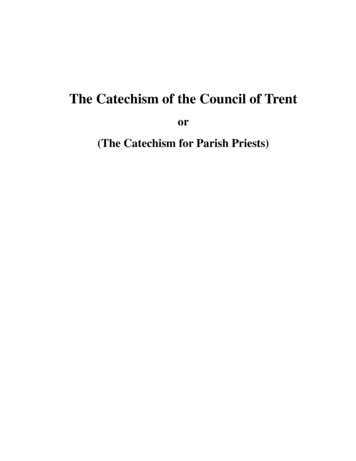
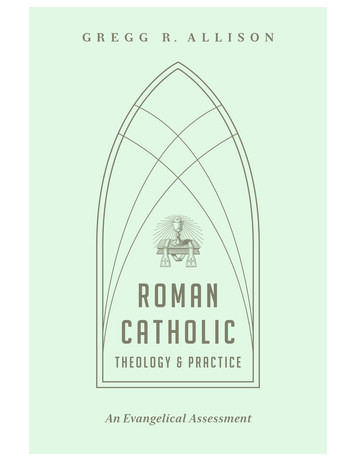
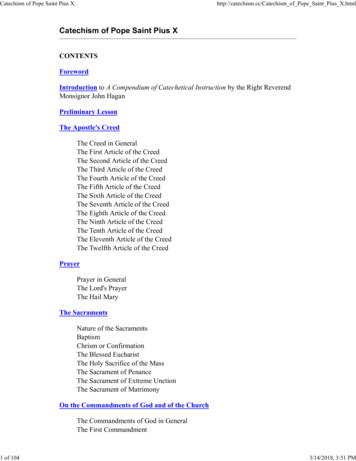
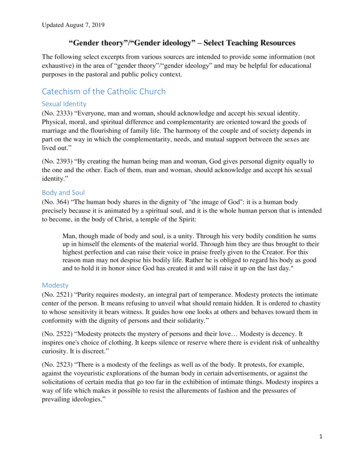
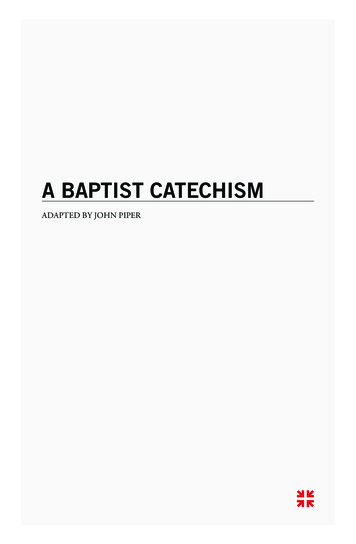


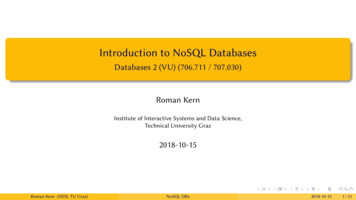

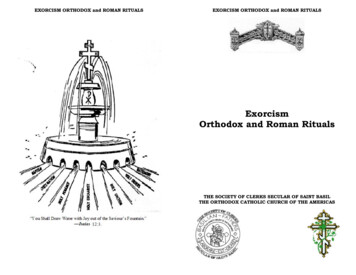
![Untitled-3 [mainetelugu ]](/img/4/telugu-alphabet-workbook.jpg)